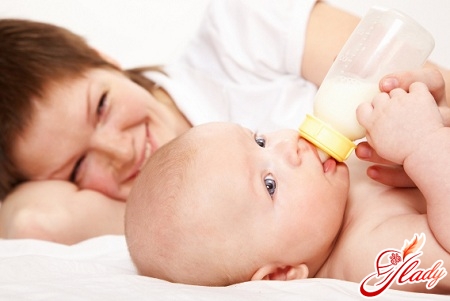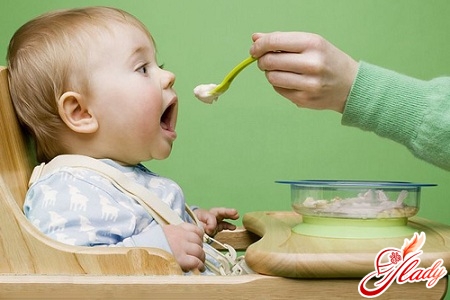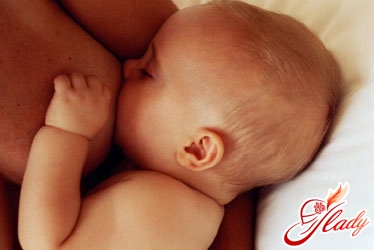 Milk is a valuable and very important product in nutritiona small child. It contains many useful substances necessary for the growth and development of children: these are fats, proteins, minerals, various vitamins, and carbohydrates. Therefore, many parents try to introduce their child to this product as soon as possible. However, they do not take into account that fat cow milk is not suitable for babies who are still breastfeeding, while it affects the older children more beneficially. And, as you know, the right and balanced nutrition in the first year of life affects the child's further development and his health. Qualified pediatricians recommend not to milk the baby with whole milk, until it turns 12 months old. In some countries, this threshold is somewhat lower - 36 weeks. As for Germany, then, for example, doctors are against cow's milk in the diet of a child up to two years. If, on the strength of health or other problems, the mother can not feed her child on her own, it is better to use infant formula, adapted for toddlers of different ages. And only then gradually introduce into the diet specialized milk, adapted to your taste, as well as the composition of the characteristics of the body of infants. By the way, consider that for a one-year-old child the daily rate of cow's milk is not more than 200 grams. In this case, it should not be given as an independent product, but as a part of puree or porridge. Let us dwell on why cows' milk is not useful for children under the age of twelve months. Firstly, it includes a large number of minerals that cause discomfort in the baby's body. In particular, it adversely affects the urinary system - kidneys are overloaded by an average of 25%. Secondly, the cow, unlike breast milk, contains more sodium and protein, which can cause a variety of allergic reactions. Therefore, according to experts, if regularly, since birth, to give their child a given product, then chances are good that the allergy will become a constant companion of the child.
Milk is a valuable and very important product in nutritiona small child. It contains many useful substances necessary for the growth and development of children: these are fats, proteins, minerals, various vitamins, and carbohydrates. Therefore, many parents try to introduce their child to this product as soon as possible. However, they do not take into account that fat cow milk is not suitable for babies who are still breastfeeding, while it affects the older children more beneficially. And, as you know, the right and balanced nutrition in the first year of life affects the child's further development and his health. Qualified pediatricians recommend not to milk the baby with whole milk, until it turns 12 months old. In some countries, this threshold is somewhat lower - 36 weeks. As for Germany, then, for example, doctors are against cow's milk in the diet of a child up to two years. If, on the strength of health or other problems, the mother can not feed her child on her own, it is better to use infant formula, adapted for toddlers of different ages. And only then gradually introduce into the diet specialized milk, adapted to your taste, as well as the composition of the characteristics of the body of infants. By the way, consider that for a one-year-old child the daily rate of cow's milk is not more than 200 grams. In this case, it should not be given as an independent product, but as a part of puree or porridge. Let us dwell on why cows' milk is not useful for children under the age of twelve months. Firstly, it includes a large number of minerals that cause discomfort in the baby's body. In particular, it adversely affects the urinary system - kidneys are overloaded by an average of 25%. Secondly, the cow, unlike breast milk, contains more sodium and protein, which can cause a variety of allergic reactions. Therefore, according to experts, if regularly, since birth, to give their child a given product, then chances are good that the allergy will become a constant companion of the child.
Signs and Symptoms of Allergies
Allergy to milk and its derivatives -a type of food intolerance, which is most often observed in infants and in most cases passes to two years. The main symptoms are: frequent loose stools, nausea and vomiting, bloating, colic, nervousness and moodiness of the child immediately after feeding. Other reactions may also occur: rashes on the face and other parts of the body (diathesis), discharge in the form of a cold, lacrimation, shortness of breath. In addition, the stool is usually watery, sometimes liquid with mucus or with an admixture of dark blood. However, it should be borne in mind that the symptoms of this pathology are not specific. Exactly the same signs can be a consequence of other diseases, including infectious. Therefore, in the first place, when these conditions occur, you need to contact a pediatrician. 
Causes and consequences of the disease
Medics have proven that a food allergy is transmittedat the genetic level. That is, if the child's parents are intolerant to certain foods, then the baby is more likely to be exposed to this disease. Usually, milk is allergic to children who have been breastfed since the first months of their life. In most cases, infants are sensitive to the cow product, much less often - on pectoral, sheep and goats. Cow's milk is made up of proteins that are resistant to heat, so even when you are cooking the product, you can not lower its allergenicity. The main culprit of the disease is casein, but sometimes the ailment provokes lactose - milk sugar. However, an allergy to milk and lactose deficiency are two completely different things. The latter appears as a result of the absence or weak activity of the enzyme that cleaves lactose. Both anomalies have similar signs, so only a qualified specialist can diagnose the disease correctly. An allergy to mother's milk can be caused by a cow product that a woman used during pregnancy, since casein is able to enter the fetal bloodstream through the placenta. Also, increased sensitivity is possible if the nursing mother eats food that provokes the development of reactions (for example, shrimps, nuts or chocolate and the like). In order to protect your child and prevent the occurrence of allergies, it is recommended to follow a strict diet. But in general, breast milk is the most hypoallergenic product, it is ideal for feeding children. Therefore, in the presence of intolerance in breastfeeding immediately translate crumbs into special mixtures can not. Usually it is enough just to adjust the ration of the nursing mother. Many children allergy to milk often goes to two to four years of age without any consequences, but sometimes the signs of the disease can persist until the end of life. Such people need to constantly adhere to a certain diet. If you do not make adjustments in the diet, then there are possible various violations in the body, both from the nervous system and the gastrointestinal tract. If parents continue to feed the baby with allergenic food, then in the future it can lead to a developmental gap (mental and physical). Also, an improper diet can further aggravate an allergy, which is fraught with an expansion of the list of intolerable foods and the emergence of such reactions (eg, Quincke's edema or anaphylactic shock), the consequences of which can be deplorable. 
How to treat allergies?
Allergy is a disease that can be recognizedamong intestinal and infectious pathologies, therefore, before you treat a child, you need to carry out a diagnosis. In this case, the doctor, having examined the patient and excluding lactose deficiency or another ailment, appoints a special diet, which usually includes a complete ban on eating food that contains protein casein. If the baby is breastfeeding, the mother should refuse (or limit the intake) from products that cause such a reaction to the child's body. Even if the symptoms do not disappear after the measures taken to correct the nutrition, the question is raised about transferring the baby to the adapted mixtures. Note that the allergy is often observed in children who were very early (up to six months) transferred from breastfeeding to artificial or from the very birth they were given "from a bottle". This is due to the fact that the composition of most mixtures includes cow's milk, which causes such a reaction. In this case, they should be replaced with a product based on hydrolyzed proteins or soy. Usually, nutrition for hypersensitive kids is called hypoallergenic, which the manufacturer reports on the labeling on the package. Select the mixture in stages, constantly watching the reaction of the child. If you have tried all the possible options, and the symptoms of the disease do not pass, then most likely, the cause of the ailment lies in the other. To determine what is the matter, consult a doctor. In the event that the baby is sensitive to cow milk, then after making a six-month break, you can try to reintroduce the mixture and products based on it and see how the child's organism responds to it. Some pediatricians do not recommend doing this until one year. Doctors have found out that sour-milk food is absorbed by allergy sufferers much easier, so it's better to give milk in this form. Over time, your child will be able to use other foods, and after that he will stop observing the restrictions and get rid of allergies. If signs of an illness persist, then a gentle diet can take longer, and sometimes all life. We advise you to read:









